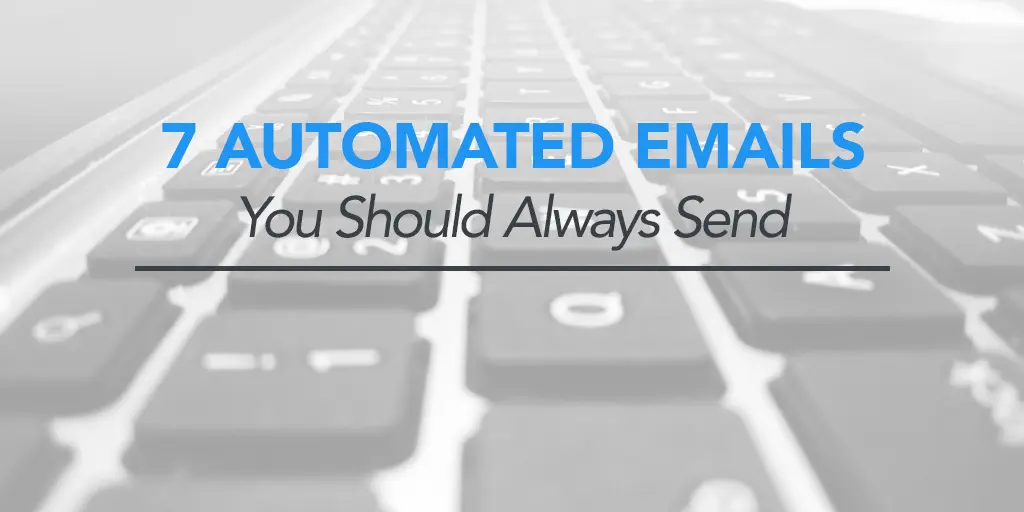
For building brand identity and delighting customers, what tops an email? An automated email.
Aside from in person engagement, nothing’s better than a well-timed, carefully worded email for interacting with your customers, especially if the email is sent automatically.
Imagine a world where you can send emails without having to lift a finger.
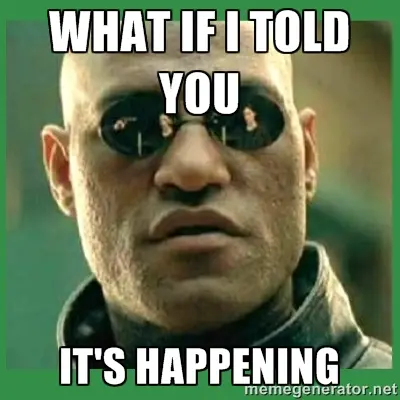
Image Courtesy of Meme Generator
Allow me to get spooky for a moment. You see, the inbox is a sacred place. When a customer gives you their email address and invites you to send them emails about your brand, it’s a hallowed moment– especially if it’s a real email address. They’re inviting you into their space. They’re actually giving you permission to sell to them. Don’t let that divine moment pass you by. Honor it with a shrine of lit candles or, at the very least, a welcome email.
Okay, spooky mode off.
Let’s talk about how to use automated emails to wow your audience and grow your brand.
Check out this list of best practices for every type of automated email. Subscribe to receive this extra resource.
What’s an Automated Email?
An automated email is one sent out without direct initiation from you. To create an automated email, you’ll compose a message and then set it up to send whenever a specific behavior triggers it. We’ll take a look at the different types of automated emails you can create below.
As you’ll see, automated emails are a crucial part of the user experience.
Anticipate the roadblocks your customer may encounter and give them a way to win with your brand. Click To Tweet
Use automated emails to create solutions to common problems.
Alternately, automated emails can help you express gratitude and share valuable information that your audience will love to know about. Let’s take a look at the seven ways to use automated emails to your major advantage.
The Welcome Email
The Welcome Email is the standard automated email that we all know and look for. Chances are you’ve received a “welcome to the list” email before. If you have an email list, you’re probably using one yourself—but are you using it to its maximum efficiency?
Your welcome email should be about two things: managing expectations and sending them right back to your website. Sure, they just left, but you want them to come back as often as possible, and that starts immediately. But, don’t just send them to your home page. Send them on a super specific mission.
Check out how this Starbucks’ welcome email guides subscribers on what to do next, whether that’s update a profile, join a loyalty program, or follow on social media.0
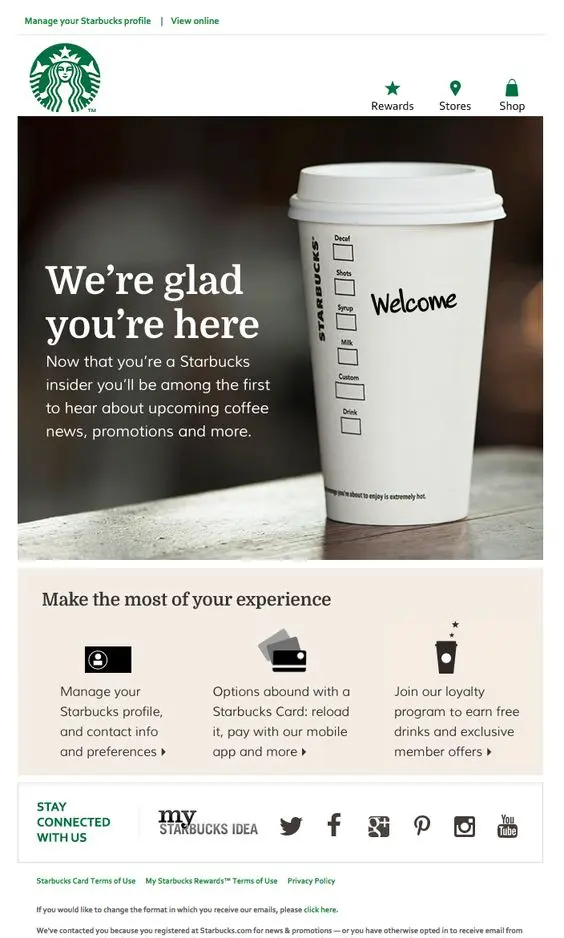
Starbucks – We’re Glad You’re Here, Image Courtesy of Pinterest
Pinterest does something similar with a welcome email that introduces itself to users in an easy to understand way (pictures help).

Pinterest – Welcome to Pinterest, Image Courtesy of Pinterest
The Thank You Email
The Thank You Email is simple and straightforward. Sometimes, it’s a run of the mill order confirmation, other times, it’s a rah-rah-celebratory moment. But the Thank You Email always represents an opportunity to connect with your customers.
Converse expresses thanks while also driving subscribers back to their website:
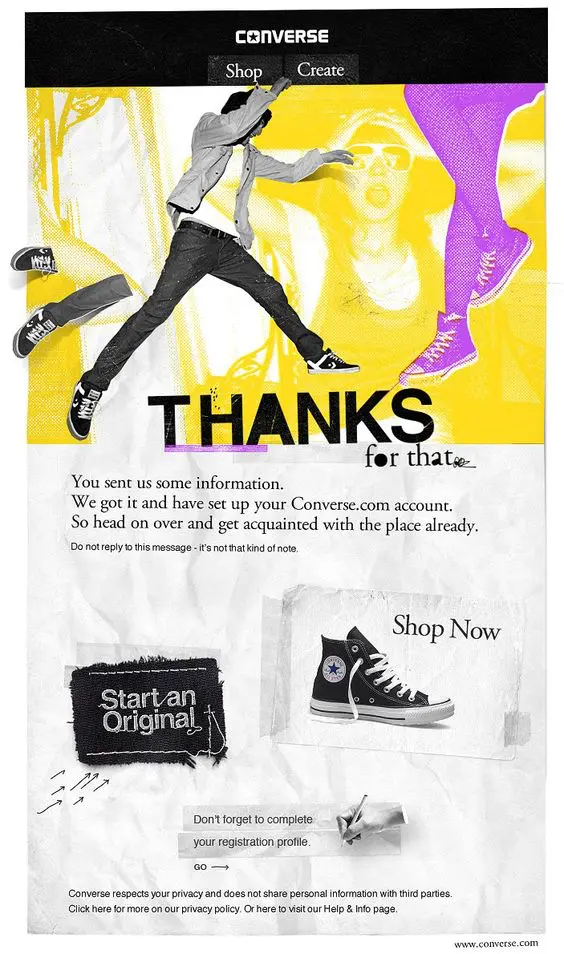
Converse – Image Courtesy of Pinterest
Shoedazzle’s order confirmation email includes everything a customer needs to know (processing times, order summary, and return and exchange policy). It also harkens the customer back to the website to scout out new arrivals:
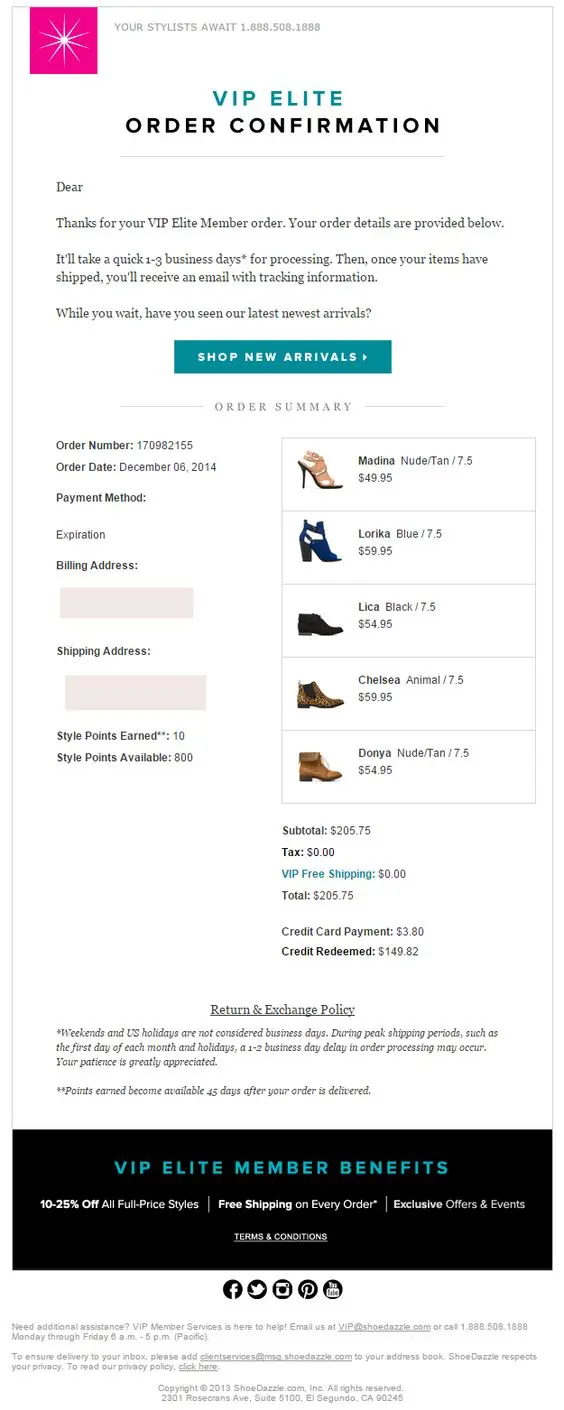
Shoedazzle – Image Courtesy of Pinterest
The Abandoned Cart Email
I hate to be the one to break it to you, but 75% of online shopping carts are abandoned, wheels up. If you sell products online, you’re probably aware of this fact already. But there is something you can do about it.
Send the Abandoned Cart Email.
This email is straightforward but presented in a helpful tone.
People abandon carts for different reasons. Most for unexpected costs, some because of a problem on the website, and others because they were just window-shopping. The fact is, you don’t know what’s causing it, so you need to send an email to re-establish contact.
Now’s not the time to be modest. Pull out all of the incentives to close the sale. Sometimes, you have to give folks permission to buy your product. They’ll make excuses, and you’ll need to counter those excuses in the form of discounts and free shipping.
The most important thing to do is send the email quickly. You can actually recover an abandoned cart if you act immediately, and the best way to do this is through an automated email.
Structure your checkout experience so that, in order to begin the checkout experience, a customer must enter their email address. This way, when they leave, you can reel them back in with special offers.
Levi is pretty smooth with their abandoned cart email. They offer a 25% discount code as a powerful incentive to complete the order.
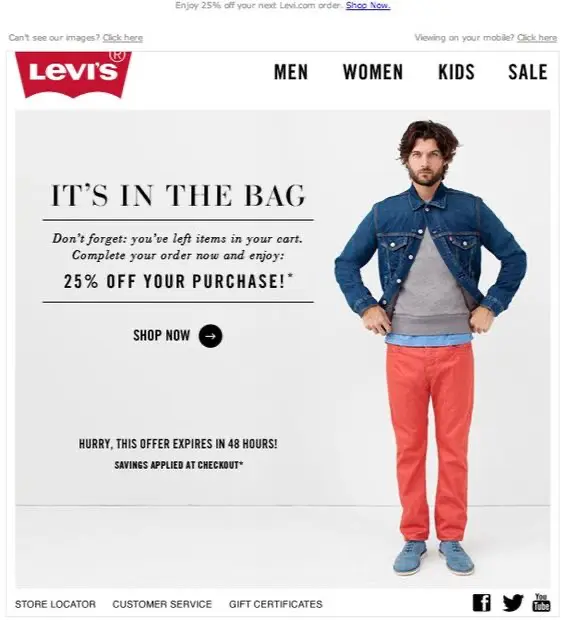
Levi – Image Courtesy of Pinterest
Kate Spade uses the power of visual persuasion to woo customers back. The email also emphasizes free shipping, which can motivate a customer to return.
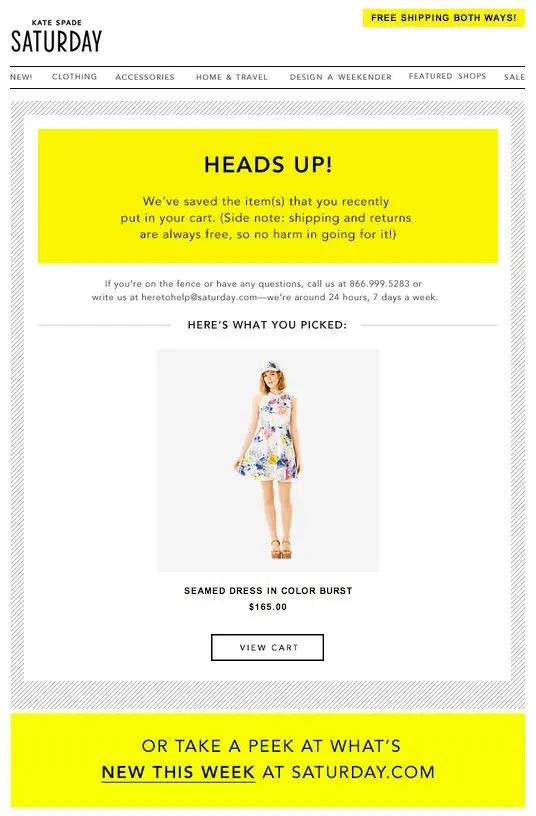
Kate Spade – Image Courtesy of Pinterest
The Happy Birthday/ Anniversary Email
Another great automated email to send is the Happy Birthday/ Anniversary Email. Always look for a way to celebrate your customers, and what better time to do it than on their birthday?
Birthdays are a festive time when people are more likely to indulge themselves. Pair that with a special discount code, and you’re much more likely to sell.
By the way, birthdays don’t have to come only once a year. Or anniversaries either, for that matter. Check out how American Apparel finds a way to stretch one birthday into two opportunities to sell:
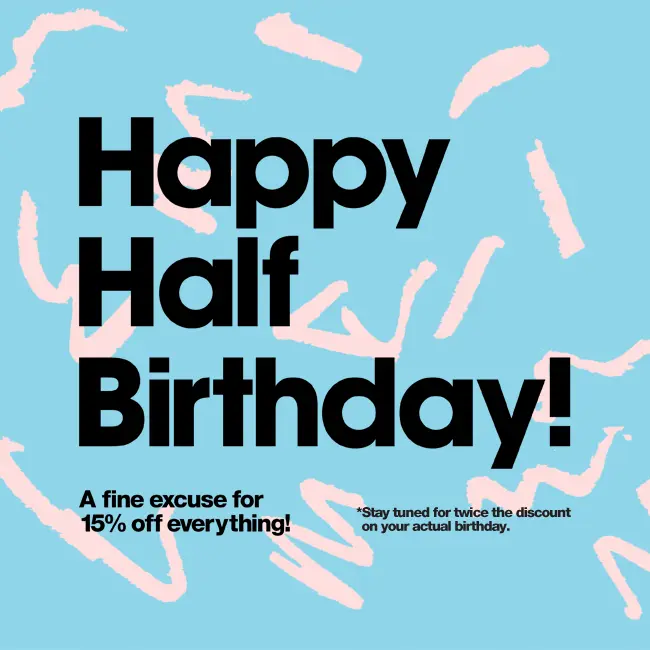
American Apparel – Image Courtesy of Pinterest
Don’t know their birthday? That’s alright. Send out an email asking for those details and then promise to reward them like Lee Jeans does here:
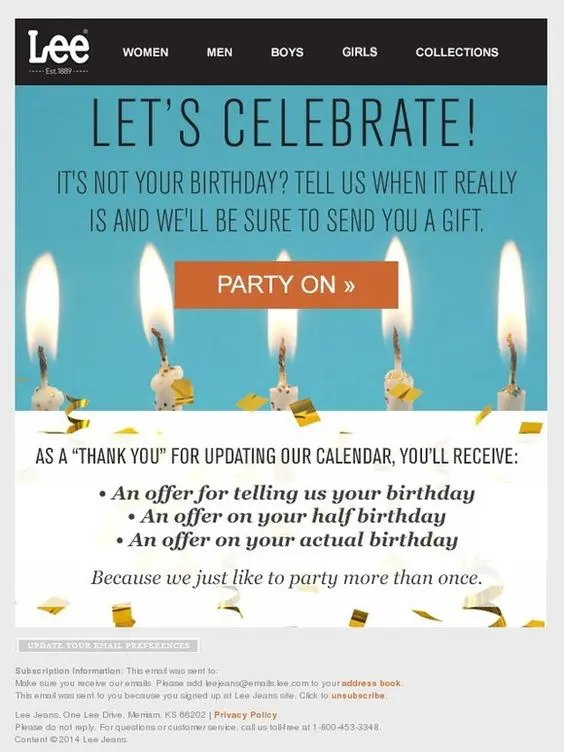
Lee Jeans – Image Courtesy of Pinterest
The Win Back Email
You’ll have subscribers who’ve joined but never seem to open your emails, visit your website, or buy your products. There’s an automated email for them, too. It’s called the Win Back Email, and it’s one of my favorites.
For those subscribers who may have drifted off, woo them back with a witty message and a discount code, like Loft does here:
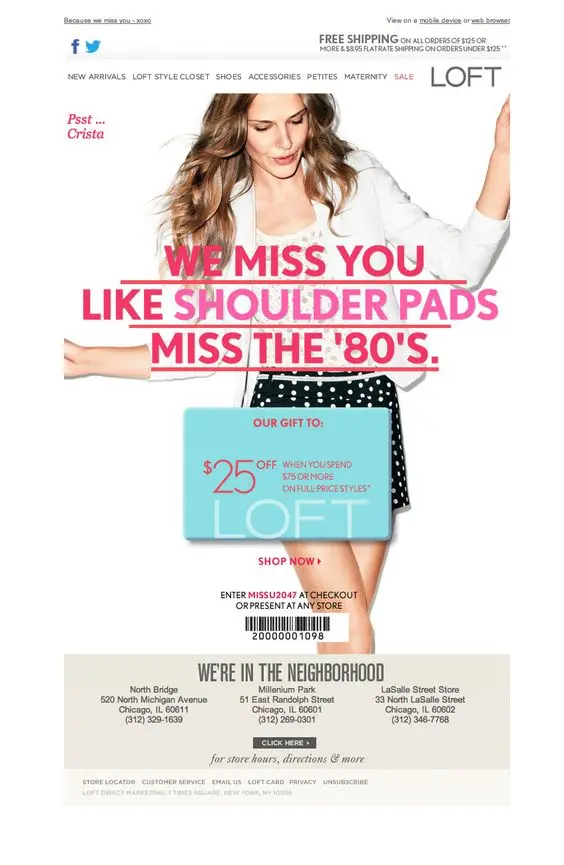
Loft – Image Courtesy of Pinterest
Alternately, you can use a powerful narrative to elicit an emotional response, like Missguided does:

Missguided – Image Courtesy of Pinterest
The Viral Incentive Email
The Viral Incentive Email is an exclusive KickoffLabs feature. With this type of email, you can motivate your most engaged customers through rewards. For example, after a customer refers a specific amount of leads, you can send a congratulatory automated email. In this email, offer free shipping or a special promo code as a reward, and an incentivize to them to keep on driving forward.
The Influencer Email
The Influencer Email is also one of those killer features you’ll only find here at KickoffLabs. It’s perfect for superstar referrers. You can send out these emails to notify users of their referral activity within a specified time range.
This type of email goes hand in hand with running a successful referral contest. If you’re running a contest where the top referrer wins a prize, use the Influencer Email to keep participants informed with their current ranking. This is a fun way to awaken your participant’s competitive side.
Final Thoughts
Email is good, but automated email is great. You can set up emails to work for you 24/7, especially when you’re away from your desk. If you have an email list, whether there’s five people on it, or 5000, you can still use automated emails to enrich your communication and build your brand.